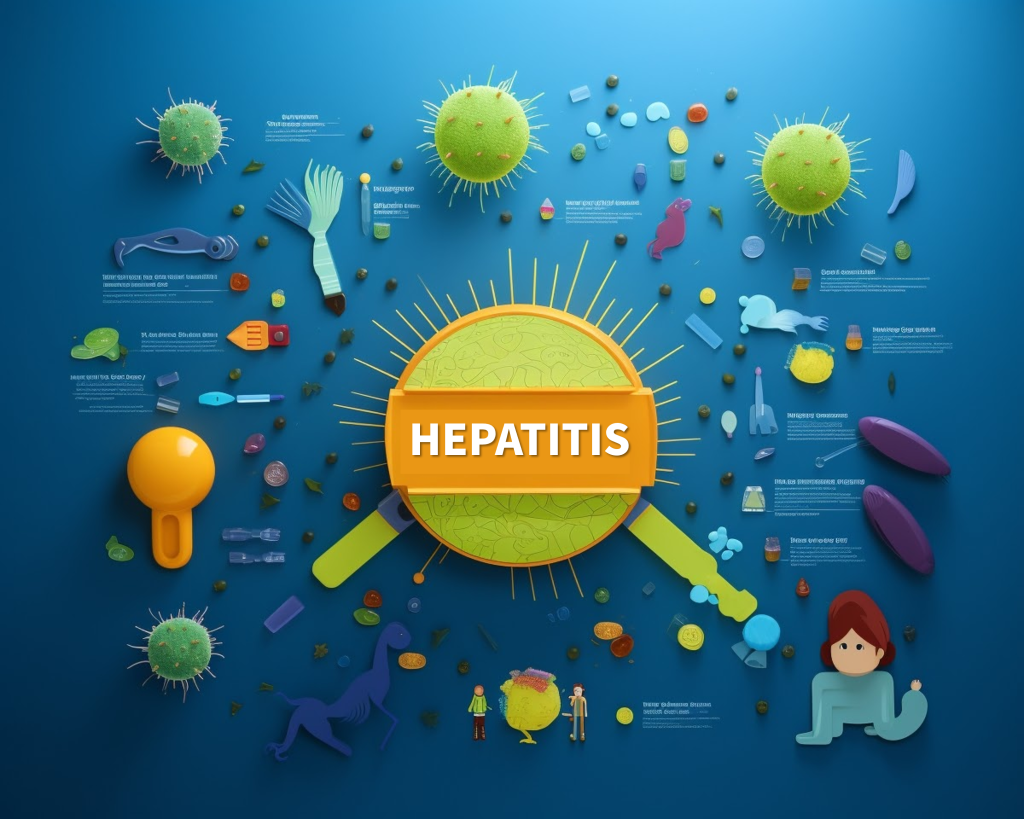Time:
Today is World Hepatitis Day, and WHO has come up early with this year's related theme: improving hepatitis testing and treatment coverage to bring hope and support to patients! We can learn from the Global Hepatitis Report 2024 that 3,500 people are killed by viral hepatitis infections every day. WHO tries to warn us that Hepatitis, a silent killer, is quietly spreading across the globe.
Hepatitis is an inflammation of the liver that can lead to a range of health problems and can be fatal. There are five main strains of the hepatitis virus, known as types A, B, C, D, and E. The hepatitis viruses are known to cause liver disease. While they all cause liver disease, they differ in important ways, including mode of transmission, disease severity, geographic distribution, and prevention methods.
Many people with hepatitis A, B, C, D or E show only mild symptoms or no symptoms at all. However, each form of the virus can cause more serious symptoms.
Symptoms of hepatitis A, B and C may include fever, malaise, loss of appetite, diarrhea, nausea, abdominal discomfort, darkening of the urine and jaundice (yellowing of the skin and whites of the eyes). In some cases, the virus may also lead to chronic liver infections, which may subsequently develop into cirrhosis (scarring of the liver) or liver cancer. Such patients are at risk of death.
Hepatitis D is found only in people already infected with hepatitis B; however, dual infection with hepatitis D and hepatitis B can lead to more severe infections and poorer health outcomes, including accelerated progression to cirrhosis. The development of chronic hepatitis D is rare.
Hepatitis E begins with a mild fever, loss of appetite, nausea, and vomiting that lasts for several days. Some people may also have abdominal pain, itching (and no skin lesions), rash, or joint pain. They may also have jaundice, darkened urine, pale stools, slight enlargement of the liver, tenderness (hepatomegaly), or occasionally acute liver failure.

The answer is: yes, hepatitis is not far away. According to WHO's Global Hepatitis Report 2024, viral hepatitis is the second leading cause of infectious disease deaths globally, causing about 1.3 million deaths each year. Take some of the regions as an example.
In 2019, a severe hepatitis A (HAV) outbreak occurred in the US state of Maryland, primarily affecting drug-using populations, homeless people, and men who have sex with men of the same sex.
The Hepatitis A virus spreads so quickly that an infected person can spread the virus to others up to two weeks before symptoms appear, and most people don't develop symptoms until about a month after infection. This makes it more difficult to control the outbreak.
In response to the outbreak, public health departments and volunteers conducted a massive free hepatitis A vaccination campaign among the homeless.
On March 31, 2022, five cases of children with unexplained severe hepatitis were first reported in Scotland, UK. As of May 20, 2022, data from the European Surveillance System (ESS) showed that 650 suspected cases, at least 38 requiring liver transplantation, and 9 deaths had been reported in 33 countries. Most of the children presented with vomiting and jaundice with elevated transaminases, and most of them had no fever.
Global health organizations are closely monitoring the situation and are actively conducting research to determine the cause of the disease and develop effective prevention and treatment strategies.
According to a UN release on December 3, 2023, there has been a significant increase in infectious diseases in UN shelters in the southern Gaza Strip, with an outbreak of hepatitis A in one of the shelters.
Infectious diseases such as diarrhea, acute respiratory infections, and skin infections have also increased significantly due to overcrowding and poor sanitation in UNRWA shelters in the south. At the same time, due to the destruction of medical facilities and the severe shortage of resources for medical services, the injured and others in need were unable to receive timely medical care.
In 1986-1989, a large-scale hepatitis E epidemic broke out in southern Xinjiang, China. There were nearly 120,000 cases and 707 deaths;
In 2007, the Prime Minister of Nepal himself, six cabinet members, and 25 staff members of the Prime Minister's residence were collectively infected with the hepatitis E virus;
An outbreak of hepatitis E in Australia in 2014; and an outbreak in a nursing home in Hokkaido, Japan, in 2016;
A small hepatitis E outbreak in Italy in September 2019 that may have been caused by pork products or live animals; and an outbreak of hepatitis E in a nursing home in Zhejiang Province in 2022 due to consumption of undercooked pig liver;
An outbreak of hepatitis E in the Ouaddai Province of eastern Chad in March 2024, with 2,092 cases of hepatitis E in Chad as of April 28, including seven deaths.
It is important to note that hepatitis outbreaks may vary by region, time of year, and specific virus type.
WHO is acutely aware of the seriousness of hepatitis and recognizes it as a major global public health problem. Hepatitis not only affects the health of individuals, but also puts a huge strain on the economic burden on society.
In order to effectively deal with hepatitis, we need to start with several aspects.
Raising public awareness: Through education and publicity campaigns, we can help people understand how hepatitis is transmitted, such as through contaminated food and water, and certain sexual behaviors. With this knowledge, people can take appropriate preventive measures, such as vaccination and good personal hygiene, to effectively reduce the risk of infection.
Vaccination: The primary means of preventing viral hepatitis is vaccination. Hepatitis A and B can be prevented by vaccination, while there is no vaccine for hepatitis C and D yet.
Cutting off the route of infection: Avoid unprotected contact with blood, body fluids, excreta, etc. of patients with viral hepatitis. Do not mix personal utensils such as razors and toothbrushes with others, and strictly sterilize medical devices when using them. Avoid direct contact with medical wastes of treated hepatitis patients and strictly dispose of medical wastes.
Adopt good living habits: reasonable use of medication, limiting alcohol, healthy diet, less staying up late, detoxification, etc. can help to prevent hepatitis.
Medication: Use antiviral drugs such as tenofovir or entecavir to treat hepatitis B infected people. Interferon is also an effective antiviral treatment but may have side effects.
Rest: Some types of hepatitis, such as hepatitis A and hepatitis E, are self-limiting. With rest, avoidance of alcohol, and symptomatic treatment, most patients recover completely after a few weeks.
Liver transplantation: For hepatitis that has progressed to a very severe level, liver transplantation is the only treatment.
Disposal of medical waste is an important part of cutting off the pathway of infection. Medical waste from patients who have been treated for hepatitis should be managed properly:
Classified collection: medical waste should be classified and collected according to its characteristics and disposal methods. Infectious waste, injurious waste, pathological waste, pharmaceutical waste and chemical waste should be treated separately.
Disinfection and treatment: Waste items contaminated by blood of patients with viral hepatitis C should be classified and disposed of following the requirements of relevant laws and regulations.
Temporary storage: Medical and health institutions should establish temporary storage facilities for medical waste, and should not store medical waste in the open air and pay attention to the time of temporary storage of medical waste.
Disposal organization: medical waste should be handed over to the relevant qualified organization for disposal, such as medical waste disposal company.
Occupational health and safety protection: medical and health institutions should equip the personnel engaged in classification, collection, transportation, temporary storage and disposal of medical waste with the necessary protective equipment, and conduct regular health checks.
Regular checkups: It is recommended that liver function be checked once a year, and people with existing chronic liver diseases should be rechecked every 3-6 months.
Early intervention: keep an eye on one's liver function through regular and targeted medical checkups, so as to achieve early detection and early intervention.
Community service: Organize volunteers to provide hepatitis screening and health consultation services in the community.
A WHO study found that by 2030, an estimated 4.5 million premature deaths could be prevented in low- and middle-income countries through vaccinations, diagnostic tests, medicines and education campaigns.
As a medical waste disposal equipment manufacturer serving more than 300 cities and regions around the world, LI-YING is helping to cut off the spread of hepatitis.
The company's equipment is based on microwave sterilization technology, and it has several series of medical waste disposal equipment products. The technical level has reached the international advanced level and is the largest microwave sterilization equipment manufacturer in the world. Moreover, the sterilization rate of LI-YING equipment reaches 99.9999% (6log10). This ensures that medical waste is handled safely and effectively, preventing infectious pathogens from spreading through the waste. We have been committed to the harmless disposal of medical waste, killing bacterial viruses to prevent the spread of disease and making the world more beautiful because of me.
On this special day, LI-YING expresses its deepest love and blessings to all hepatitis patients! We believe that through the joint efforts of the whole society, we can reduce the number of new hepatitis infections. Let's move forward hand in hand to support the improvement of hepatitis testing and treatment coverage, and provide better healthcare services and support to patients.

What is the Polluter Pays Principle The Polluter Pays Principle, abbreviated as PPP, means that the entities causing pollution should bear the costs of pollution…

Forests and wetlands are crucial components of the Earth’s ecosystems, serving multiple functions such as climate regulation, water purification, and biodiversity maintenance. With the acceleration…

Of course! LI-YING has extensive experience in the harmless treatment of medical waste, particularly with microwave technology. Our equipment is distributed globally, serving over 300…
PDF Request